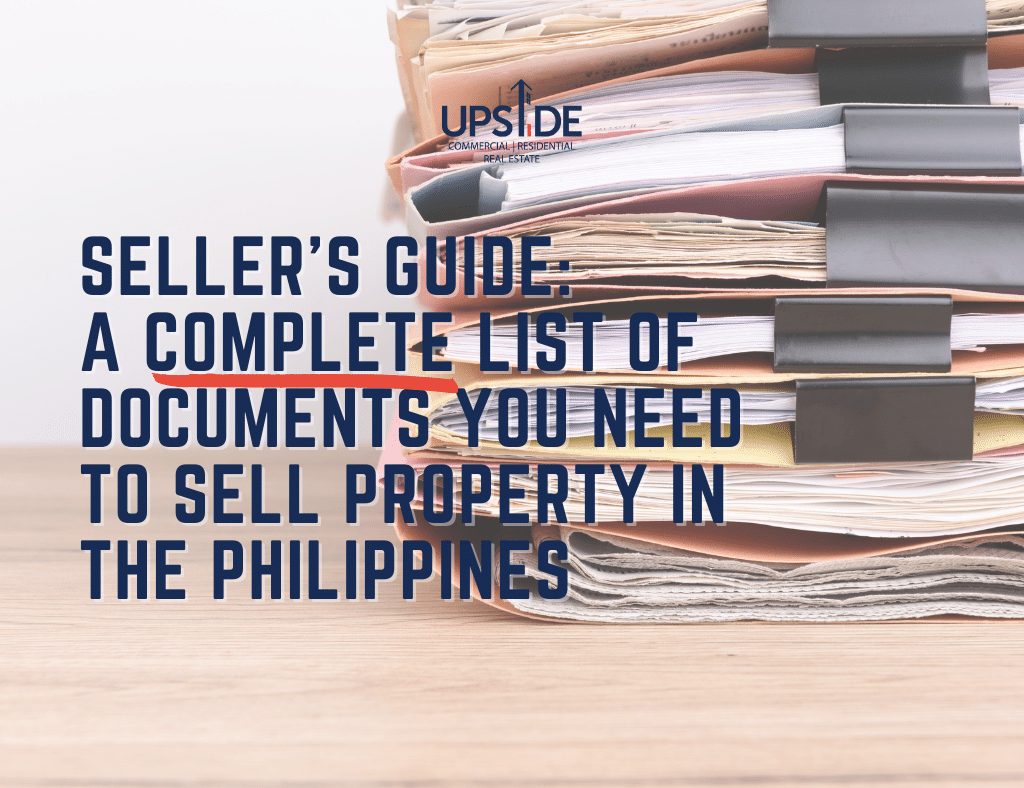

Planning to sell your property in the Philippines is not as simple as we’d all like. There is a specific procedure that needs to be followed and a long list of documents that must be secured or else your property may not be sold. Take heart! Upside CEO Mitor Alipio and Managing Partner Kabbie Alipio talk about selling your property in their podcast, “Seller’s Complete Guide to Property Selling in the Philippines”.
Kabbie says, “It’s important for sellers to realize that selling your property is not as simple as posting photos online… We can shed some light on the seller’s journey from documentation to handing over your property to your buyer.” Here is a comprehensive list of all you need to sell your real estate:
Mitor stresses that even before selling your property, make sure you have a physical copy of the title in your hands. He asks, “Is the title with you, or do you think it’s with you?” Kabbie adds that the main goal of a buyer is to have the property transferred to his name. She says, “That will not happen if the seller cannot present a copy of the title.”
Obtain these important documents from the Registry of Deeds:
If you own a condominium, get these:
If you are a corporation selling property, secure these on top of your titles:
If you’re a seller based abroad, these are the additional documents you need:
You may also need to procure these documents:
Mitor emphasizes, “We recommend you get the certified true copy of title ahead of time and… have it checked. It will hasten the process.”
The owner or broker must procure these documents from the Assessor’s Office:
If you own a condominium, get these:
The owner or broker must procure these documents from the City Treasurer’s Office:
Mitor says that aside from paying your property taxes, you need to make sure that your LGU is aware of any changes like improvements on your property. Undeclared changes will be subject to back taxes.
“What is the next step after getting all these documents?” Mitor asks. “Know the tax that would apply to your property. At the end of the day, you’re selling the property because you have use for the funds… You’re liquidating. You’re looking at your net. How do you know your net if you don’t know your expenses?” And the biggest expense will be taxes.
Mitor advises, “You really need to talk to your accountant, tax lawyer, auditor especially if it’s an ordinary asset so you can prepare legally how to minimize your taxes.”
He also gives an important tip to protect yourself: “Know the correct taxes and pay with a manager’s check.”
Taxes aren’t the only deductions from your profit. Here are additional expenses:
Kabbie advises, “Get an exclusivity arrangement with a broker so that the broker can maximize the exposure of your property.” The broker will take care of the collaterals and advertising so you won’t have to worry about these details.
A broker will also be in charge of property viewings. Buying a home especially is an emotional as well as a financial investment so a buyer is keen to see potential homes. You must be willing to open your property to viewing but understand that you can’t be there personally. Many times, a buyer is intimidated to ask about the property if the owner is at the viewing or doing the home tour. What could be ordinary questions about the property like how old it is, what needs fixing, and what’s causing certain smells, could be deemed as intrusive and insulting by the owner. So it’s best to hire a broker or property manager to handle viewings.
A licensed broker can also help process the entire sale – from procuring documents, managing taxes, producing collaterals, and handling marketing and viewings. Brokers aren’t just mere tour guides of your property, they are also professionals who know all the ins and outs of selling property in the Philippines.